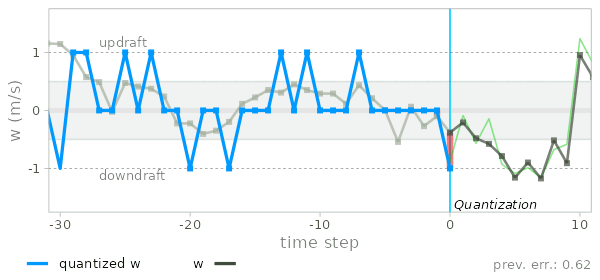This repository contains code and data supplementary to the paper
100-fold improvement in relaxed eddy accumulation flux estimates through error diffusion
Currently under peer review. A preprint is available on arXiv: https://arxiv.org/abs/2312.17027
Key idea
The key idea is rethinking relaxed eddy accumulation (REA) as a process of quantizing the vertical wind velocity. Inherent biases in fluxes quantified via REA are attributed to the correlation between scalar concentration and quantization error. To minimize these biases, an error diffusion algorithm is developed. This algorithm randomizes the quantization error, thereby reducing its correlation with the scalar - and consequently, the biases in the flux - to near zero. The resulting method, termed quantized eddy accumulation with error diffusion, maintains the minimal operational requirements of a constant sample flow rate, similar to REA. However, unlike REA, it is a direct method (β factor is not needed) and stands out as the first micrometeorological method that allows an increase in the signal-to-noise ratio without compromising accuracy.
-
Reproduce the results reported in my paper you can run the simulation described in the paper and produce the reported figures and results.
-
Run the simulation on your own high-frequency data If you are curious about the performance of quantize eddy accumulation on a particular atmospheric constituent or site data, you can easily run the simulation on your own high-frequency dataset. Read further for more details.
-
Provide reference functions for QEA implementation and flux calculation Under
implementation, I have provided a reference implementation for the error diffusion algorithm and an example of flux calculation source with synthetic data.
Note: running the analysis for the subset dataset will download about 425 MB of raw input data from zenodo. The full dataset is about 2.5 GB
To run the simulations and reproduce the results, clone the repository to your
local machine, then type make similar to the following commands
git clone https://github.com/anasem/quantized-eddy-accumulation.git
cd quantized-eddy-accumulation
make
The resulting plots and results will be saved under the directory output/
under the root project folder.
Note that this by default will run the simulation on a two-week subset of the
data. To run the simulation on the full dataset, edit "src/config/default.R" and
change the subset parameter to FALSE then run make again.
To change the simulation parameters or the data used, edit the file
src/config/default.R then run make again.
To minimize the errors in fluxes calculated via QEA, it is recommended to use a quantized level (full-scale value) in the range [4,5] σw and a quantization threshold in the range 0.55 to 0.85 of the full-scale value
To run the analysis on your own data, you need high-frequency measurements of
the scalar concentration and the 3D wind velocity. The data should be formatted
as one data.table with the following columns
| Variable Name | Description | Units |
|---|---|---|
| time | unique time stamp POSIXct | seconds since unix epoch |
| CO2 | wet molar density | |
| H2O | wet molar density | |
| Ts | sonic temperature | Kelvin |
| u, v, w | 3D wind velocity components |
Save the data as one RDS file in the input directory and edit the
src/config/default.R file to point to your data file.
Make sure to set download_input_data to FALSE.
These units will produce fluxes in the units
Running the simulation on a subset of two weeks takes about 1 hour to complete on a modern Intel CPU with 12 cores and 32 GB of RAM.
This analysis was only tested on Linux.
The following R packages need to be installed
packages <- c("data.table", "ggplot2", "patchwork", "Rcpp",
"lubridate", "pracma", "hms", "scales", "psd",
"ggridges", "tools", "parallel")
A script to install these packages is provided in src/install_dependencies.R
Below is the output of sessionInfo() on my machine
sessionInfo()
```R
> sessionInfo()
R version 4.3.3 (2024-02-29)
Platform: x86_64-pc-linux-gnu (64-bit)
Running under: Arch Linux
Matrix products: default
BLAS: /usr/lib/libblas.so.3.12.0
LAPACK: /usr/lib/liblapack.so.3.12.0
locale:
[1] LC_CTYPE=en_US.UTF-8 LC_NUMERIC=C
[3] LC_TIME=de_DE.UTF-8 LC_COLLATE=en_US.UTF-8
[5] LC_MONETARY=de_DE.UTF-8 LC_MESSAGES=en_US.UTF-8
[7] LC_PAPER=de_DE.UTF-8 LC_NAME=C
[9] LC_ADDRESS=C LC_TELEPHONE=C
[11] LC_MEASUREMENT=de_DE.UTF-8 LC_IDENTIFICATION=C
time zone: Europe/Berlin
tzcode source: system (glibc)
attached base packages:
[1] parallel tools stats graphics grDevices utils
[7] datasets methods base
other attached packages:
[1] ggridges_0.5.6 psd_2.1.1 scales_1.3.0
[4] hms_1.1.3 pracma_2.4.4 lubridate_1.9.3
[7] Rcpp_1.0.12 patchwork_1.2.0 ggplot2_3.5.0
[10] data.table_1.15.0 nvimcom_0.9-163 colorout_1.3-0
loaded via a namespace (and not attached):
[1] vctrs_0.6.5 cli_3.6.2 rlang_1.1.3
[4] generics_0.1.3 glue_1.7.0 colorspace_2.1-0
[7] fansi_1.0.6 grid_4.3.3 munsell_0.5.0
[10] tibble_3.2.1 lifecycle_1.0.4 compiler_4.3.3
[13] dplyr_1.1.4 RColorBrewer_1.1-3 timechange_0.3.0
[16] pkgconfig_2.0.3 R6_2.5.1 tidyselect_1.2.0
[19] utf8_1.2.4 pillar_1.9.0 magrittr_2.0.3
[22] withr_3.0.0 gtable_0.3.4
```
